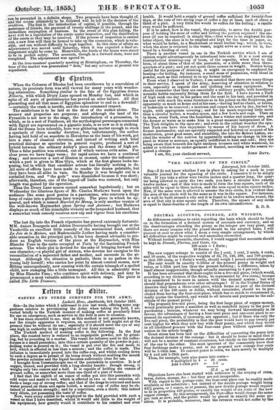(Olt Dtottro.
When the Colossus of Rhodes had been overthrown by a convulsion of nature, its prostrate form was still viewed for many years with wonder- ing admiration. Something similar is the fate of the Egyptian drama Itritocris, with which Drury Lane opened on Monday last, and which in spite of all sorts of preliminaries has proved an utter failure. All that placarding and all that mass of Egyptian splendour to end in a downfall ! —certainly the crash is terrific, and the ruins command respect.
The misfortune is to be laid at the door of the author alone. The scenery and properties are gorgeous ; and although the land of the Pyramids is not new to the stage, the introduction of a procession, in which, as in a sort of Pantheon, all the mythological personages connected with Egypt are represented on a gigantic scale, is as new as it is striking. Had the drama been tolerable, here was glittering matter enough to stock a spectacle of three months' duration ; but, unfortunately, the author having laid hold of an anecdote in Herodotus as the basis of his work, got into a state of classical elevation, and instead of writing such brief practical dialogue as spectacles in general require, produced a sort of hybrid between the ordinary Astley's piece and the drama of high art. Thus a false position was created, out of which various evils arise. For clear prose we have foggy verse ; for rapid action we have a continual drag ; and moreover a sort of illusion is created, under the influence of which a part is given to Miss Glyn, which at the first glance looks im- posing, but in which that excellent actress has literally nothing to do. All sorts of efforts have been made to render the drama palatable, but they have been all alike in vain. On Monday it was brought out in a curtailed form, and "the gods" were dissatisfied because it was short ; afterwards, therefore, one of the lopped-off limbs was restored, but only length was gained by the operation.
Thus the Drury Lane season opened somewhat lugubriously ; but on Wednesday the hilarious figure of Mr. Charles Mathews burst upon the audience like some good genius in a pantomime, who converts a dingy heap of ruins into a glittering fairy temple. The piece in which ho ap- peared, and which is named Married for Money, is only another version of the well-known Haymarket piece Spring and Autumn; but Mathews displays so much of his inimitable vivacity as the henpecked husband, that a somewhat weak comedy receives new sap and vigour from his exertions.


























 Previous page
Previous page